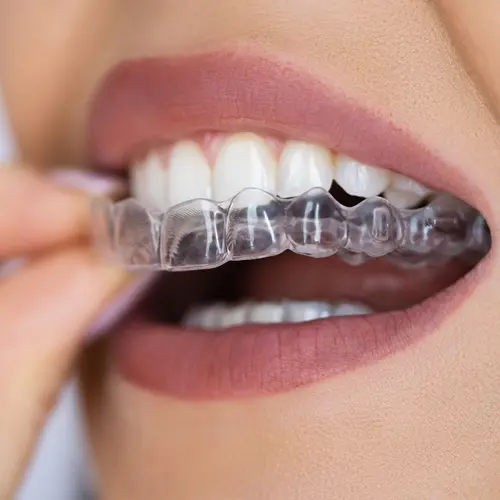Struggling with snoring and sleeplessness? Call your dentist. Snoring and sleep disturbances are often signs of obstructive sleep apnea, and your oral health could be to blame.
“A lot of patients are surprised that I ask about their sleep,” says Martha Cortes, DDS, a dentist in in New York who specializes in sleep apnea. But “a dentist is often the earliest diagnostician of sleep disorders.”
The National Sleep Foundation estimates that 18 million Americans have sleep apnea. The condition causes repeated breathing interruptions throughout the night; the pauses can last from a few seconds to minutes and may occur 30 or more times per hour. These pauses happen because the muscles in the back of the throat are flaccid, the tongue is too large, or the jaw is too small, causing airway obstructions.
The first sign of sleep apnea is often tooth grinding (also called bruxism). Dentists look for worn tooth surfaces, a sign that a patient grinds their teeth. Grinding can cause tooth wear and breakage as well as inflamed and receding gums. A spike in cavities can also be a sign of grinding because the force damages teeth, making them susceptible to cavity-causing bacteria.
At night while sleeping, “When you tense your jaw and grind your teeth, it sends a message to your brain to wake up so you can take a breath,” Cortes explains.
Grinding is just one oral health sign of sleep apnea. A small jaw, tongue with scalloped edges, or redness in the throat (caused by snoring a lot, which is another symptom of sleep apnea) are also signs.
Gasping for breath causes people to wake up repeatedly, which diminishes sleep quality and causes fatigue. Sleep apnea is linked to a higher risk of high blood pressure, heart disease, diabetes, and obesity.
When a dentist thinks someone has sleep apnea, they will often recommend a sleep study. (Note that although dentists are well versed in the symptoms and treatments, only a medical doctor can make an official diagnosis of sleep apnea, Cortes says.)
Cortes suggests asking your dentist these three questions:
Is a night guard enough? An over-the-counter night guard might not fix the problem by itself, and may even make sleep apnea worse. “If you’re wearing through the night guard, it might be time to see a specialist,” Cortes says. A custom-made guard can reduce grinding -- and the cavities, headaches, and jaw pain it causes -- and help with sleep apnea.
Is my periodontal disease a sign of a bigger problem? “If there’s a lot of decay, it could be a result of grinding and sleep apnea,” Cortes says.
How do I know if I have sleep apnea? Chronic snoring is the most common sign of sleep apnea. Other symptoms include daytime drowsiness, waking up with a dry mouth, or sore throat and morning headaches. If you have any of these symptoms, bring them up to your dentist.
Find more articles, browse back issues, and read the current issue of "WebMD Magazine."
